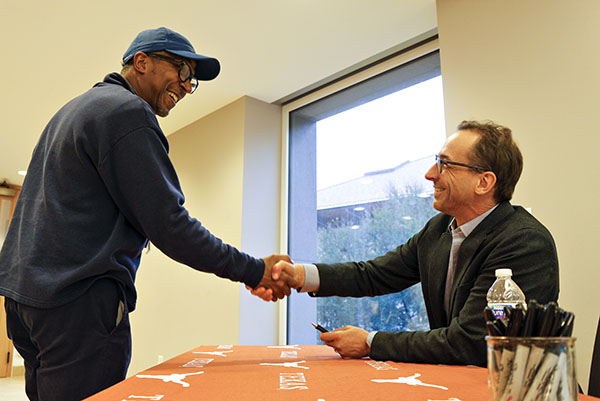Ivonne Martinez said she came to the University from an under-resourced high school on the west side of San Antonio. Although she finished second in her class, she said she struggled immensely in her first courses at UT.
“All I could feel was, ‘Why am I failing?’” mathematics junior Martinez said. “‘Is it impossible for me to succeed in this class?’”
Author and journalist Paul Tough discussed his book “The Years That Matter Most: How College Makes Or Breaks Us” with a panel of faculty featured in the book at the Blanton Auditorium Tuesday. Tough’s book explores how low-income or first-generation students can go to universities, such as UT-Austin, only to feel they do not belong.
“We as faculty generally want to be agnostic to what’s going on in our (classrooms),” said David Laude, panelist and chemistry professor. “We don’t want to believe that the economic divide has such a profound effect on students when, in fact, economics is what gets people that huge opportunity to be 30 or 40 or 50 yards ahead before the race even began.”
Martinez was featured in Tough’s book and attended the panel Tuesday. She said she began to think her failure in calculus was a direct effect from her family’s low-income status and believed she was just born into a group destined to fail in higher education.
Laude said how students perceive themselves and their abilities drastically affects their performance.
“All they needed was a semester of somebody really caring,” Laude said. “Then suddenly, they were actually better performers than the regular student population.”
Tough said low-income and first-generation families are the ones that need the most help, but they get the least support. Tough and faculty said the best way to set up this success is to give them confidence.
“You give them confidence by creating a crisis.” said Uri Treisman, panelist and calculus professor. “You cannot develop scholars without creating an environment where they have to face their demons and really figure out what they can do.”
Treisman said the idea that low-income students are not unique or worthy is hindering performance in both their academic and social careers.
“Students I talk to often don’t understand how important they and their stories are, but those experiences are special and will get them to places like medical school if they only tell them,” Laude said.





















